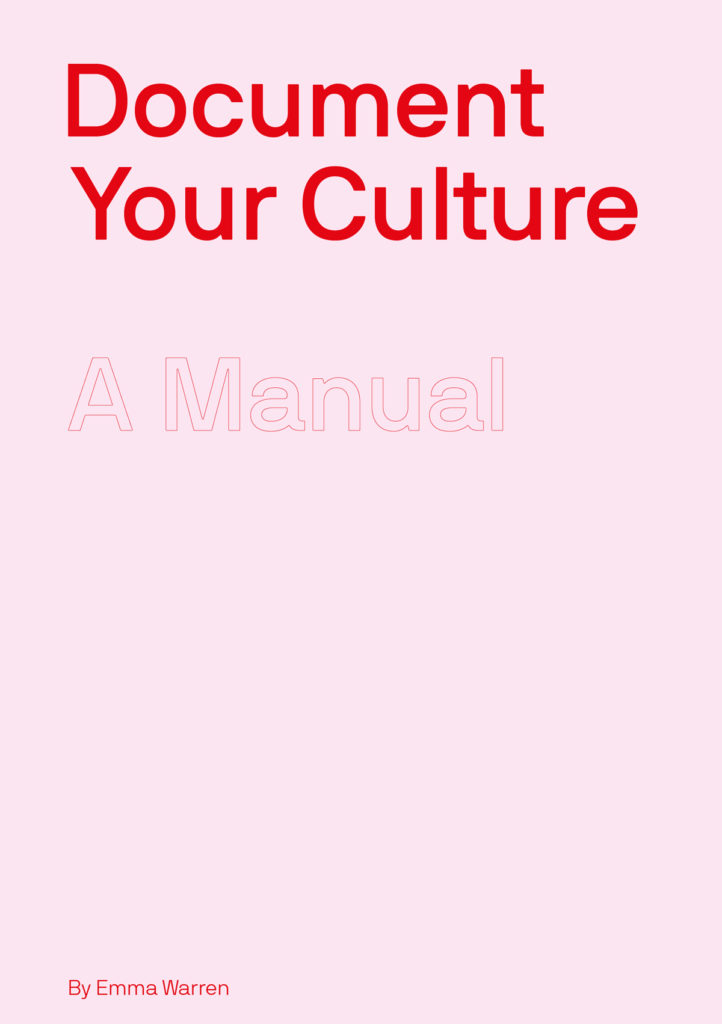Emma Warren’s Document Your Culture — a pamphlet guiding readers through the process of immortalising spaces of cultural significance — is out today, published by Sweet Machine. Dancefloor aficionado Rob Gallagher evaluates.

Emma Warren’s Document Your Culture: A Manual is well aware of the time it finds itself in. In the six months from March to August, the tectonic plates of our society could be felt shifting. The pandemic rocked the foundations of how we thought our cities and futures were going to be. The flux of the economy and its accompanying downturn have yet to reach any definites; the only certainty seems to be that change will come. The politics of how that change will be shaped, and by who, are starting to align themselves.
This pamphlet — born out of workshops that Emma has been running — looks forwards, toward the struggles of how we are to re-configure our cities, towns and spaces. It seeks to arm those who wish spaces, particularly youth-orientated spaces, to be allocated to communities. To make this case is to argue against the economics of austerity and the march of the developers. The vitality of a UK DIY culture, that has done so much to invigorate so many lives, needs its petri dishes to germinate in. Those petri dishes are spaces like buildings, and also digital space. Emptied high streets, and no longer used office blocks, pubs, restaurants, will offer new potentialities, but they are going to have to be argued for and claimed. On one level the pamphlet is a toolkit on how to document the productive cultures that have come out of such places, and empower and inform the argument to councils and local government on why they should be re-allocating real estate for cultural use. Emma puts it better than me: ‘Explanation can be an act of protection, validation and resistance, both when dealing with people who want to shut down a space and when reaching out to people who might be able to support it.’
On another level, the pamphlet acts as a key to unlocking the joy of stories that may not have been documented yet, or have been documented from only one perspective, or by people who weren’t actually there. For me, I think one of the most interesting revelations of talking about clubs and events that happened decades ago has been that people who were at the same space relay that experience very differently to how I do. Memory is a creative act; I’ve started to think that we are all getting something different from those moments of togetherness, making those fleeting moments felt in real time even more precious. There’s a strength in the unity of telling a story that links up with other, similar stories in other cities and other countries. The power of art and culture to engage young minds is well documented, but unfunded and pushed to the side during the austerity years. There’s a powerful argument for allocating space to such activities rather than funding more stop and search.
In these days before the immunisation, my teenagers are having to go through their rights of passage with a face mask and at a social distance. When that distance can finally be shrunk they will look to come out of their digital realm and to be together in the spaces they will find. We can make that search a little easier for them. This pamphlet is infused with Toni Morrison’s ‘unreasonable optimism’, and maybe we should all ally ourselves with it — to document our culture, tell our stories, and empower demands for the space that we all need — but most of all for the next generation. As it says on the back cover, pass this on to someone who needs it.
*
‘Document Your Culture‘ is available now, as a pamphlet and an audiobook.